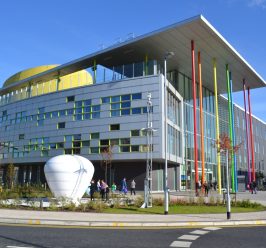Introduction
Our service aims to provide a diagnostic and clinical management service for children and young people living with a neuromuscular condition. We are a tertiary referral centre covering the North West and the department works closely with cardiology, endocrine, general paediatrics, respiratory, orthopaedic, clinical genetics and psychology services within the hospital. We are also a clinical research trial centre.
The service was awarded ‘Paediatric Centre of Clinical Excellence’ by Muscular Dystrophy UK in 2019 as well as being part of the North West Adult and Paediatric Neuromuscular Network that achieved ‘Network of Excellence’ status in 2017.
Meet the Team
Paediatric Neurology Consultants with a specialist interest in neuromuscular conditions:
Dr Imelda Hughes
Dr Gary McCullagh
Dr Uma Varma
Dr Emily Whitehouse (Clinical Fellow)
Neuromuscular Specialist Practitioners:
Janet Johnson
Wendy Foo
Nicola Earl
Highly Specialised Neuromuscular Physiotherapist:
Sinead Warner
Clinic and research coordinator:
Anam Nazir
Other professionals you may meet or talk to:
- Respiratory Technician
- Psychologist
- Dietician
- Speech and Language Therapist
What to expect when you see us in clinic
- Having height and weight measured
- Breathing tests if needed
- Meeting several members of the team, which may include medical students
- Discuss and explore any problems and difficulties your child is experiencing
- Medical and therapy assessment which may involve removing some items of clothing e.g. shoes and socks
- Opportunities to ask questions
- An agreed plan and if necessary arrangement for further tests and appointments
Preparing for your appointment
- Talk to your child about why they are coming
- Know the names and doses of any medication
- Think about questions you may want to ask using our question sheet
- Bring along any splints, braces or other orthotic devices you wear
Treatment for Type-1 Spinal Muscular Atrophy (SMA)
Spinal muscular atrophy is a rare genetic neuromuscular condition. It is caused by defects in both copies of the survival motor neuron 1 gene (SMN1). This gene produces the survival motor neuron (SMN) protein which maintains the health and normal function of motor neurons. Individuals with SMA have insufficient levels of the SMN protein, which leads to loss of motor neurons in the spinal cord, producing weakness and wasting of the skeletal muscles. There is a wide spectrum of severity of SMA from the most severe type 1 (non-sitters) through type 2 (sitters) to type 3 (walkers).
Type 1 is the most common, symptoms of muscle weakness usually begin between 0 and 6 months. Infants are unable to sit without support. They also often have feeding and breathing difficulties due to their weak muscles. Generally, the earlier the onset of symptoms, the more severe the condition.
At Manchester Foundation Trust (MFT), Royal Manchester Children’s Hospital has a long-established paediatric multidisciplinary neuromuscular team who provide the multi-faceted care required by all children with SMA.
In recent years new treatments have become available for this condition. These include Nusinersen and Onasemnogene abeparvovec (Zolgensma). You can read more about these in the boxes below.
For more information on SMA, please visit https://smauk.org.uk
For more information on treatments for SMA, please visit the website of your regional neuromuscular centre – https://www.musculardystrophyuk.org/get-support/support-services-in-your-area
Events
Our team have twice hosted the national SMA Treatment Educational Event. Slides and video recordings of the events are available here.
|
June 2022 In this session we hear from families and their experience of an SMA diagnosis, a broad overview of the care considerations, the new medical treatments, physiotherapy care and further experience of an individual living with SMA. |
Video | Slides |
|
November 2022 SMA is a treatable condition. Treatment is more effective with earlier diagnosis, so SMA is now a time critical diagnosis. In this session we explore case studies of diagnosis pathways, get to grips with what to look out for in new born babies, and hear about the benefits of newborn screening. In a second part we dive deeper into respiratory care inc secretion management, and take a look at the evolving phenotype of the SMA population |
Video | Slides |

